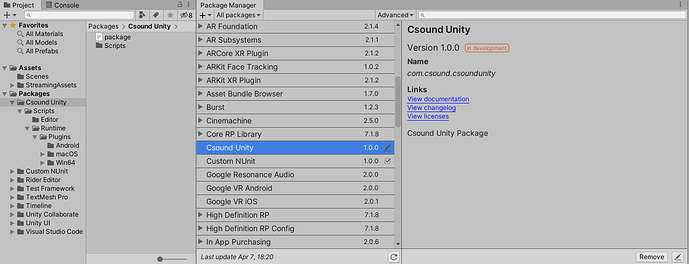Hi, Very happy to see all the activity on CsoundUnity/Android and looking forward to it. I wanted to see if there had been any work on MacOS recently, and verification of builds on Mojave or later.
I have just recently returned to doing builds on MacOS and I’m experiencing some issues that I didn’t have about a year ago. As I understand it, there are at least two important things that have changed in the environment since that time. The symptoms are related to trying to package an application build independent of Unity, which requires that the app work without Csound being installed on the system. I used to be able to place a copy of CsoundLib64.framework under Contents/Frameworks/MonoEmbedRuntime/osx/lib/Assets/StreamingAssets. That no longer works, I’ve spent quite a bit of time testing alternative (setting environment variables DYLD_PRINT_APIS=true DYLD_PRINT_LIBRARIES=true MONO_LOG_LEVEL=debug) to see what directories are being attempted by mono and MacOS
Unity/mono: (2019.1.14f and up), have upgraded .NET from 2.5 to 4.x and this changes mono’s behavior quite a bit.
MacOS: Mojave and beyond: One can no longer set the DYLD environment variables due to SIP (Systems Integrity Protection)
I’m continuing to work on it, but any pointers would be super-appreciated



 Thanks for these guidelines, they are super useful.
Thanks for these guidelines, they are super useful.
 What a shame!
What a shame!





 ]
]